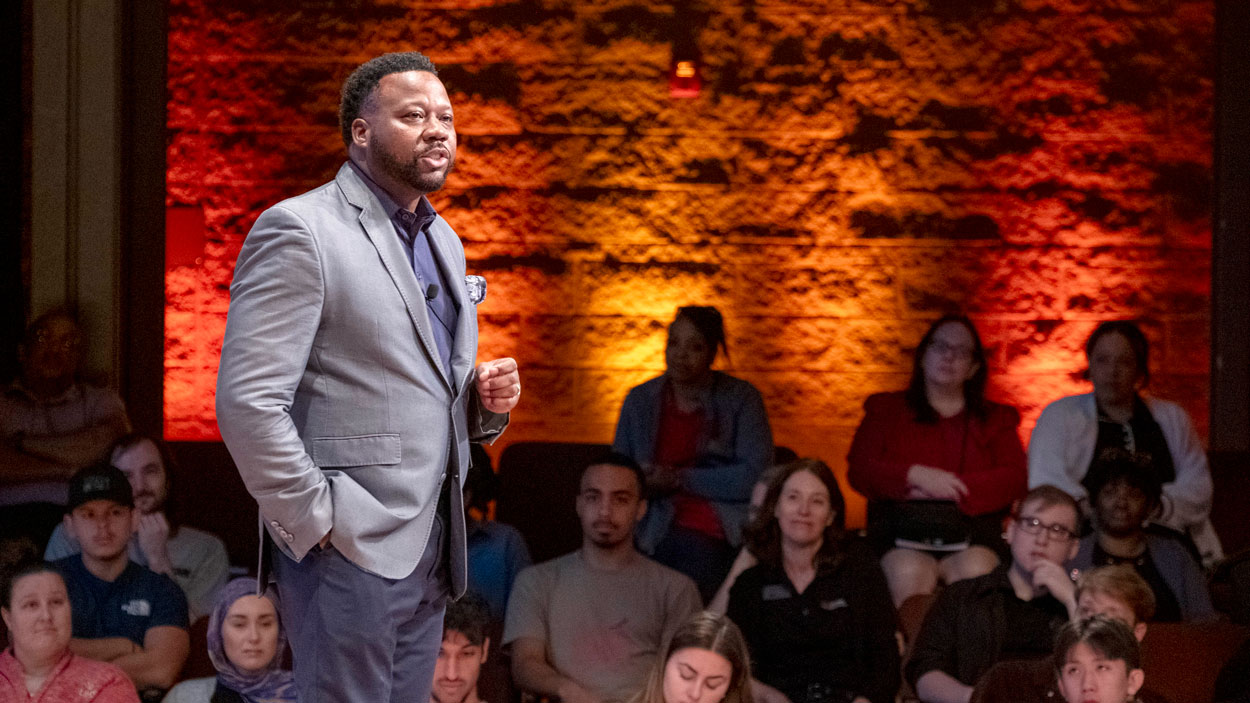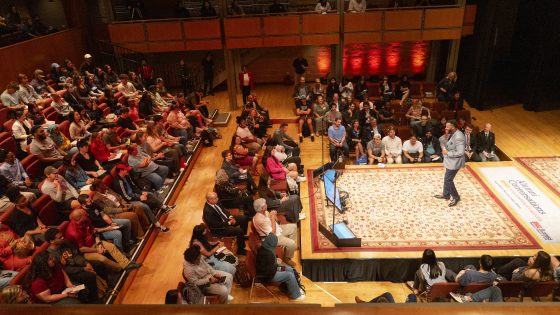
UMSL alum Orv Kimbrough, CEO of Midwest BankCentre, was the featured speaker at the latest edition of the “Ethics: A Foundation For Success” series. (Photos by Derik Holtmann)
The odds were stacked against Orv Kimbrough from an early age. His mother died of a drug overdose when he was 8 years old, and he spent his formative years in the foster care system.
Somewhere along the way, he heard a statistic that resonated with him. “I had been told less than 3% of the nearly 30,000 children who age out of the foster care system annually attended college,” Kimbrough said. “And an even smaller percentage would graduate.”
Kimbrough was determined to defy the odds, and that’s exactly what he did. As he stood on the stage Tuesday morning in the E. Desmond and Mary Ann Lee Theater at the Blanche M. Touhill Performing Arts Center, Kimbrough had four degrees – including an MBA from the University of Missouri–St. Louis – and a stellar resume of leadership and accomplishment throughout his career.
With his life of tragedy and triumph and the decisions made along the way, Kimbrough was the ideal speaker for the fifth installment of “Ethics: A Foundation for Success,” a series of alumni conversations started in 2022 by UMSL graduate Joseph Stieven and his wife, Mary, in collaboration with the College of Business Administration and University Advancement.
Stieven, the chairman, president and CEO of Stieven Capital Advisors, was inspired by his mentor, St. Louis businessman Elliott Stein, to create the series as a way to help prepare students for challenges and decisions that they’ll face in their careers.
Shu Schiller, dean of the College of Business Administration, opened the event with a welcome, and then UMSL Chancellor Kristin Sobolik shared a few thoughts with the audience, which filled up both the lower level and the balcony.

The Lee Theater was packed with students, faculty and alumni to hear Kimbrough talk about how his life experiences have influenced his commitment to ethical decision-making.
“I have been so looking forward to this day for what it represents, an incredible opportunity for you, our students and others, to enter into conversation with some of our most successful alumni,” Sobolik said. “Joe Stieven and I personally invited the other members of the cohort to participate in the series.”
Stieven kicked off the ethics series with his conversation in November 2022. Marcela Manjarrez, former executive vice president and chief communications officer at Centene, was the second speaker in the series, in April 2023. Warner Baxter, retired executive chairman of Ameren, spoke in October 2023, and Sandra Van Trease, former group president at BJC HealthCare, spoke in April 2024.
Kimbrough, who has been the CEO of Midwest BankCentre since 2019 after previously serving as the president and CEO of United Way of Greater St. Louis, shared personal experiences from his early life and his career that have shaped his approach to ethics, how he defines an ethical decision, and how ethics help people sort out what is good versus what is bad.
“You may be asking the question, is it really that simple?” he told the audience. “And the answer is no. Ethical dilemmas are rarely binary, especially in business. Ethical decisions are complex and shaped by multiple layers of influence, much like the circumstances surrounding the life and death of my mother.”
When he’s facing an ethical dilemma, Kimbrough said he takes the time to remind himself that there are two foundational approaches to ethics: fear-based and faith-based.
“Fear-based frameworks often lead us to unethical behaviors,” Kimbrough said. “They lead us to unethical tendencies when we act out of fear – fear of failure, fear of loss or fear related to belief that growth is not accessible, that growth is not plentiful, a zero-sum game. We may cut corners, we may deceive, we may take unethical shortcuts. Fear narrows our perspective and limits our decision-making to the short term and to self-preservation.”
Kimbrough said he’s conscious of always taking the other approach.
“Faith-based frameworks, on the other hand, guide us toward ethical behavior,” he said. “What do I mean by faith? Faith in ourselves, faith in others, faith in growth, faith in God or a higher purpose all help us make decisions grounded in integrity, help us make decisions grounded in trust, and help us make decisions grounded in hope. Faith opens us to possibilities and long-term thinking, even when it’s difficult.
“The unethical actions that most reasonable people would recognize as wrong are frequently driven by fear, driven by a mindset to fail, driven by wrong social networks, driven by a lack of accountability for our actions. Conversely, faith pushes us to act with courage and principle.”
Acting with courage and principle is essential, but often challenging, Kimbrough said.
“As I have gone deeper into leadership and board governance roles, I’m struck by how many unethical decisions made by business leaders stem from being seduced by power,” he said. “We see this across sectors where governance fails, and power distorts leadership.”
Kimbrough mentioned scandals at Wells Fargo and Enron as examples of power influencing decision-making in the wrong direction. He highlighted a book, “The Power Paradox,” by Dacher Keltner, which examines how people gain and lose influence.
“In my book, ‘Twice Over a Man,’ I talk about power as one of the core drivers that is a permanent feature throughout our lives,” Kimbrough said. “Power, for me, is more about having personal agency, not allowing people or systems in power to be the sole operative of my life outcomes or your life outcomes. Why is that important? You heard me say earlier that on average less than 3% of people who come from the background I come from will graduate college. Keltner defines power as the ability to make a difference by influencing the actions, the emotions or behaviors of others.
“I think my thoughts and his ideas are ethically compatible ideas, but what does he mean by the power of paradox? It’s such a simple idea, but it’s so true of us as humans, we rise in power and make a difference in the world due to what is best about human nature, but we fall from power due to what is worst.”
Rebecca Myers, a junior economics major, wasn’t quite sure what to expect from the event but was drawn to Kimbrough’s message.
“I think it’s important these things are said,” Myers said. “I think it’s important in every field to go back and explicitly say, ‘We have to do this morally,’ because if we don’t do that, people are going to be exploited. He put himself out there and said all those things. I thought it was great. He seems like a one-in-a-million kind of person.”














